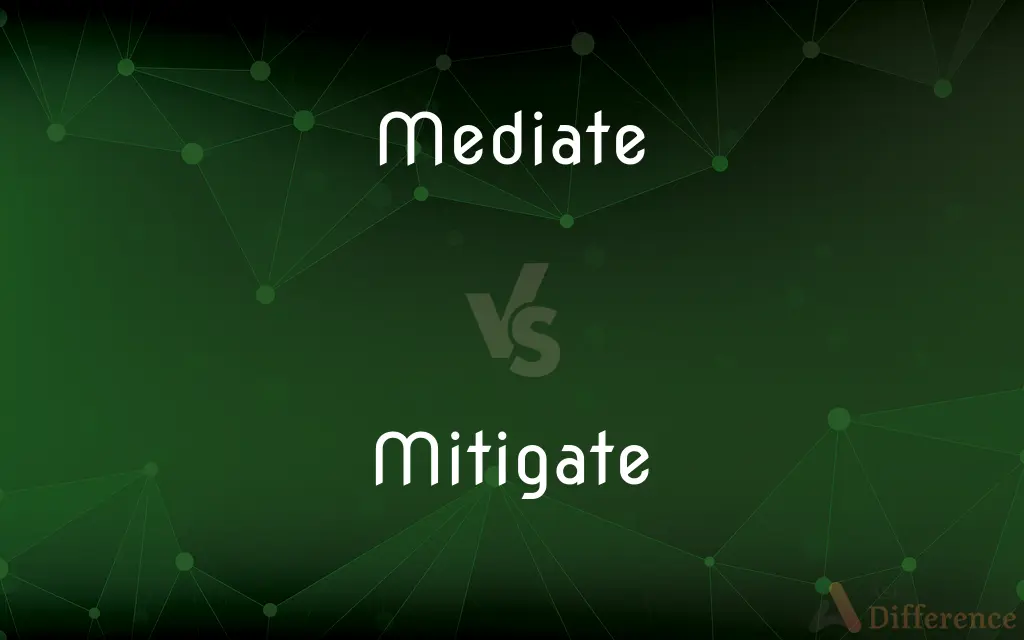Mediate vs. Mitigate — What's the Difference?
By Tayyaba Rehman & Maham Liaqat — Updated on February 24, 2024
Mediate involves intervening to resolve a dispute or bring about an agreement, while mitigate focuses on reducing the severity or impact of a situation.

Difference Between Mediate and Mitigate
Table of Contents
ADVERTISEMENT
Key Differences
Mediation is a process where a neutral third party helps disputing parties find a mutual agreement. It's about communication and negotiation, aiming for a resolution that satisfies all involved. Mitigation, on the other hand, is about taking steps to lessen the severity, seriousness, or painfulness of something, often before it becomes a larger issue. It's more about preventive or corrective measures.
While mediation is often used in conflicts, legal disputes, and interpersonal disagreements, aiming to bridge gaps between parties, mitigation is common in risk management, environmental policies, and health and safety practices, focusing on reducing negative outcomes. Mediation seeks a balanced resolution, considering the interests and needs of all parties, whereas mitigation is about implementing strategies to decrease adverse effects, regardless of the underlying conflict.
Mediation requires active participation from the conflicting parties, facilitated by the mediator, who guides the dialogue without imposing solutions. In contrast, mitigation can be a unilateral action, where one party takes measures to alleviate potential or actual problems without needing direct input from others.
The success of mediation depends on the willingness of parties to compromise and find common ground, making it a potentially lengthy and complex process. Mitigation, however, is often more technical or strategic, with clear steps and measures that can be evaluated for effectiveness.
Mediation and mitigation both aim to address problems, but their approaches differ significantly. Mediation is about dialogue and consensus, while mitigation is about action and reduction, each playing a crucial role in its respective domains.
ADVERTISEMENT
Comparison Chart
Definition
To intervene in a dispute to help reach an agreement
To lessen the severity or impact of a situation
Focus
Resolving conflicts
Reducing negative outcomes
Process
Facilitated dialogue and negotiation
Implementation of strategies and measures
Participant Role
Active involvement from all parties
Can be unilateral or involve limited parties
Outcome
Mutual agreement or understanding
Decreased severity or prevention of problems
Compare with Definitions
Mediate
To act as a neutral intermediary to resolve a dispute.
The counselor mediated between the two students to resolve their conflict.
Mitigate
To take action to reduce the severity of a situation.
The government introduced measures to mitigate the economic impact of the pandemic.
Mediate
To bring about an agreement or reconciliation through intervention.
She mediated a successful agreement between the conflicting parties.
Mitigate
To alleviate or lessen negative effects.
Planting trees can mitigate the effects of urban heat islands.
Mediate
To intervene in order to bring about a settlement.
He was asked to mediate in the family dispute.
Mitigate
To diminish the intensity of an adverse condition.
Emergency services worked to mitigate the damage caused by the flood.
Mediate
To serve as a go-between for two or more parties.
An experienced mediator was brought in to mediate the complex case.
Mitigate
To make less severe or painful.
Medications were prescribed to mitigate the patient's chronic pain.
Mediate
To facilitate communication and negotiation.
The organization offers services to mediate in labor disputes.
Mitigate
To employ strategies to minimize risk.
The company implemented new policies to mitigate cybersecurity threats.
Mediate
To act as an intermediary causal or communicative agent; to convey.
Mitigate
To make less severe or intense; moderate or alleviate.
Mediate
Act between parties with a view to reconciling differences;
He interceded in the family dispute
He mediated a settlement
Mitigate
To make alterations to (land) to make it less polluted or more hospitable to wildlife.
Mediate
To resolve or settle (differences) by working with all the conflicting parties
Mediate a labor-management dispute.
Mitigate
(transitive) To reduce, lessen, or decrease; to make less severe or easier to bear.
Mediate
To have a relation to two differing persons, groups, or things
Psychological processes that mediate between stimulus and response.
Mitigate
(transitive) To downplay.
Mediate
Being in a middle position.
Mitigate
To make less severe, intense, harsh, rigorous, painful, etc.; to soften; to meliorate; to alleviate; to diminish; to lessen; as, to mitigate heat or cold; to mitigate grief.
Mediate
Gained or effected by a medium or condition.
An act of mediate knowledge is complex.
Mitigate
To make mild and accessible; to mollify; - applied to persons.
This opinion . . . mitigated kings into companions.
Mediate
To be in the middle, or between two; to intervene.
Mediate
Being neither at the beginning nor at the end in a series;
Adolescence is an awkward in-between age
In a mediate position
The middle point on a line
Common Curiosities
What skills are important for a mediator?
Key skills for a mediator include impartiality, communication, negotiation, and problem-solving abilities.
What does it mean to mediate a dispute?
Mediating a dispute involves intervening as a neutral party to help conflicting parties reach a mutual agreement.
How can one mitigate risks?
Mitigating risks involves implementing strategies and measures to reduce the likelihood or impact of negative outcomes.
Can mediation be used in legal disputes?
Yes, mediation is often used in legal disputes as an alternative to court proceedings to find mutually acceptable resolutions.
How is mitigation assessed for effectiveness?
Mitigation effectiveness is assessed through monitoring and evaluating the outcomes of the implemented measures.
Can mitigation be done after a problem has occurred?
Yes, mitigation can be both preventative and responsive, aiming to lessen impacts even after a problem has occurred.
Is mediation always successful?
Mediation success depends on the willingness of parties to compromise and find common ground, so it's not always successful.
How does mitigation relate to climate change?
In the context of climate change, mitigation refers to actions taken to reduce greenhouse gas emissions and their impacts.
Do mediators make decisions for the parties involved?
No, mediators facilitate the process but do not make decisions for the parties; they help parties find their own solutions.
Can anyone be a mediator?
While many can mediate informally, professional mediators often have specific training and skills in conflict resolution.
What are common areas where mitigation is important?
Mitigation is crucial in risk management, environmental protection, and public health, among other areas.
What is the difference between mediation and arbitration?
Mediation involves facilitating a mutual agreement, while arbitration involves an arbitrator making a binding decision.
Can mitigation involve technology?
Yes, technological solutions are often part of mitigation strategies, especially in environmental and risk management contexts.
Are mediators always neutral?
Effective mediators must remain neutral and impartial to facilitate fair and balanced resolutions.
Is mitigation always effective?
The effectiveness of mitigation measures can vary based on the strategies used and the specific situation.
Share Your Discovery

Previous Comparison
Momma vs. Mama
Next Comparison
Reoccurring vs. RecurringAuthor Spotlight
Written by
Tayyaba RehmanTayyaba Rehman is a distinguished writer, currently serving as a primary contributor to askdifference.com. As a researcher in semantics and etymology, Tayyaba's passion for the complexity of languages and their distinctions has found a perfect home on the platform. Tayyaba delves into the intricacies of language, distinguishing between commonly confused words and phrases, thereby providing clarity for readers worldwide.
Co-written by
Maham Liaqat













































